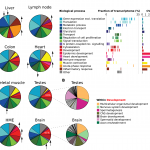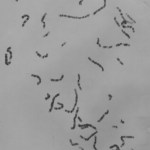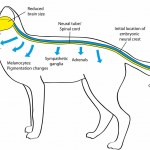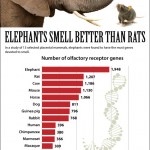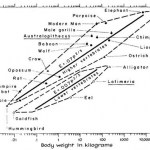evolution
It's another Dawkins question!
Why do cave-dwellers lose their eyes? They’re useless, but are they harmful? Costly to make? Or eroded by rain of uncorrected mutations?
I thought I'd already addressed this in a blog post long ago, but I searched, and I didn't -- it was my inaugural column in sadly defunct Seed magazine, way back in the paleolithic, I think. Fortunately, I still have the copy I sent in to the editor, so I resurrect it here.
Degeneration and developmentIt’s not disuse that leads to loss of organs in evolution, but competitive genetic interactions
Reduced or degenerate organs,…
Ophelia has summarized a series of science questions Richard Dawkins asked on Twitter. Hey, I thought, I have answers to lots of these -- he probably does, too -- so I thought I'd address one of them. Maybe I can take a stab at some of the others another time.
I like this one, anyway:
Why do cells have the complete genome instead of just the part that’s needed for their function? Liver cells have muscle-making genes etc.
My short answer: because excising bits of the genome has a high cost and little benefit, and because essentially all of the key exaptations for multicellularity evolved in…
Not infrequently, I’m asked why it is that I do what I do. Why do I spend so many hours of my free time, both here and at my not-so-super-secret other blog (NSSSOB), to write my detailed analyses of various forms of quackery, analyses of scientific studies, and expressions of my dismay at the infiltration of pseudoscience into medicine, particularly medical academia in a phenomenon I like to call “quackademic medicine”? One reason, of course, is because I passionately believe in what I am doing. Another reason is that I want information countering various forms of dubious medicine to be out…
Only 1% of the human genome codes for proteins, which might make you wonder what the rest of the nucleotide sequence is good for. In 2012 the Encyclopedia of DNA Elements (or ENCODE) announced that a full 80% of the genome played a biochemical role, interacting with proteins in some way. But a new study says it takes only about 8% of our non-protein-coding genes to make us human. This is the percentage of genes that are 'conserved' by the human species: change one of these genes, and you'll alter the fitness of the individual. These genes evolve slowly (although not as slowly as protein-…
It's been 25 years since Gould's Wonderful Life: The Burgess Shale and the Nature of History crystallized the debate over the importance of contingency in evolution, most famously illustrated by his metaphor of "replaying the tape of life". If we could roll back the history of life on earth and restart it in the pre-Cambrian, would we see the same forms arise again? Would we have dinosaurs a few hundred million years later, and bipedal intelligent apes after a half billion years?
Gould's answer was no -- that the role of chance was too great, and because the forms of life do not represent…
A while back, I responded to Behe/Luskin's claim that his model proving the impossibility of evolution of chloroquinone resistance was vindicated. I pointed out (as did Ken Miller) that showing that a particular trait required multiple point mutations did not affect the probability in the naive way that Behe and Luskin calculated -- in particular, it did not require that the mutations be simultaneous. We're familiar with a great many known mutations that involve multiple sequential hits to have their effect. I mentioned the work on steroid receptor evolution, and how cancer is an amazing…
"HIV mutates a lot".
People 'get' that. Why is HIV hard to stop? Why is HIV hard to treat? "HIV mutates a lot".
But HIV does not mutate willy-nilly. It mutates at an evolutionarily defined rate.
The reverse transcriptase enzyme makes mistakes during replication that are beneficial to HIV-- creating a diverse population, a quasispecies, that can 'answer' the multitude of evolutionary 'problems' the population faces. A homogeneous population would be wiped out by a particularly efficient antibody, or a targeting drug, but a diverse population means that somewhere in a population of billions,…
But we have to be clear that it is only a hypothesis at this point. I was reading about domestication syndrome (DS) -- selecting animals for domestication has a whole collection of secondary traits that come along for the ride, in addition to tameness. We are selecting for animals that tolerate the presence of humans, but in addition, we get these other traits, like floppy ears, patchy coat color, shortened faces, etc.; the best known work in this area is by Belyaev (YouTube documentary to get you up to speed) who selected silver foxes for domesticity, and got friendly foxes who also had all…
Eleven years ago, two scientists made a bet. One scientist wagered that a new type of antimicrobial agent, called antimicrobial peptides, would not elicit resistance from bacterial populations which were treated with the drugs. Antimicrobial peptides are short proteins (typically 15-50 amino acids in length) that are often positively charged. They are also a part of our body's own innate immune system, and present in other species from bacteria to plants. It is thought that these peptides work primarily by disrupting the integrity of the bacterial cell, often by poking…
Like Aesop's fable, rats have another reason to be envious of elephants. Elephants also have significantly more genes that can detect different smells (i.e. olfactory receptor genes) than other super-sniffers like rats and dogs. In fact, compared to 13 other species, African elephants have 1,948 genes related to smell putting them ahead of the previous record holder, rats that only have about half as many genes. Primates have much fewer with only 296-396 of these olfactory receptor genes. Interestingly, the common ancestor of mammals had 781 olfactory genes, meaning that primates have lost…
I think the engineers are just trying to wind me up, again. Joe Felsenstein tackles a paper published in an applied physics journal that redefines evolution and tries to claim that changes in aircraft design are a good model for evolution. It's a terrible premise, but also, the execution is awful.
But permit me a curmudgeonly point: This paper would have been rejected in any evolutionary biology journal. Most of its central citations to biological allometry are to 1980s papers on allometry that failed to take the the phylogeny of the organisms into account. The points plotted in those old…
Once again, Casey Luskin demonstrates that he's a biological ignoramus. He is much buoyed by a science report that chloroquinone resistance in the malaria parasite requires two mutations, claims that Michael Behe has been vindicated because that's exactly what he said, and demands an apology from all of Behe's critics.
Will Ken Miller, Jerry Coyne, Paul Gross, Nick Matzke, Sean Carroll, Richard Dawkins, and PZ Myers Now Apologize to Michael Behe?
No.
Here's what his critics actually said. We have no problem with the idea that a particular functional phenotype requires a couple of mutations;…
Though ERVs are my favorite tool vs Creationists, HIV is a fantastic choice as well.
I mean, has anyone seen hide or hair of Behe since 2007?
Poor guy.
Alas, there are still Creationists out there, so to address some of their 'concerns', c0nc0rdance made a couple of vids using his favorite HIV protein, Vpr:
In a previous life (of mine) my father-in-law, an evolutionary biologist, kept an oil painting of a fish on the wall of the living room. At every chance he would point out, to visitors or to anyone else if there were no visitors, that he kept a portrait of his distant ancestor hanging in a prominent location, pointing to the oil painting. It was funny even the third or fourth time. It isn't really true, of course, that this was his ancestor. It was a bass, more recently evolved to its present form than humans, I suspect. But it is true that the last common ancestor of humans and fish was a…
The debate about intelligent, extra-terrestrial aliens goes on, with the usual divide: astronomers insisting that the galaxy must be swarming with alien intelligences, which is popular with the media, and the biologists saying no, it's not likely, there are probably swarms of single-celled organisms, but big multicellular intelligences like ours are probably rare. And the media ignores us, because that answer simply is not sufficiently sensational.
But we will fight back! Here's an interesting review of the alien argument. There is actually a historical and conceptual reason why astronomers…
Stinky stuff! This fits perfectly with my biased preconceptions. So here are two examples of chemistry used to analyze things you'd normally run away from.
The oldest traces of human poop have been dug out of a cave in Spain — and it's Neandertal poop. It's about 50,000 years old, and it's been reduced to a compressed, thin smear of organic compounds, so I guess it isn't actually so stinky anymore, but there was enough of it to analyze chromatographically. In case you've wondered your whole life about what Neandertal poop would look like, here you go.
Microphotographs of a slightly burned…
1-- Herpes viruses are old. They are ooooooold. Like, hundreds of millions of years old. Specifically, about 400 million years old.
2-- Herpes viruses are everywhere. Fish, reptiles, birds, cows, humans, everywhere. And there are lots of different kinds that humans have to deal with-- CMV, EBV, HHV-8, VZV, HSV...
3-- And, though herpes viruses should not be inserted into the genome of their host cell, generally, some herpes viruses can. Its called 'strategic somatic genome integration', and some herpes viruses (and only a small percentage of cells infected with that virus) do insert…
Oh, that's right -- that's what philosophers are good for. They're really good at questioning models. John Wilkins has been busily dismantling the cheap and easy metaphors we use to describe molecular biological concepts in a series of posts, taking on genes as language, other popular gene myths and metaphors, and explaining why genes aren't information. The problem is that when we explain stuff we know well to students, we use metaphors and analogies to get across the initial ideas, and unfortunately, because scientists are human, the metaphors take on a life of their own and sometimes…
Deepak Chopra isn't very happy right now. In fact, he appears downright pissed off right now, particularly at skeptics, so much so that he's issued a hilariously fatuous "challenge" to James Randi (a.k.a.) The Amazing Randi on You Tube entitled Deepak Chopra's One Million Dollar Challenge to Skeptics:
Yes, apparently with The Amazing Meeting (a.k.a. TAM) less than four weeks away, Chopra is looking to stir the pot a little bit with his usual blend of Choprawoo about consciousness and mind-body dualism and how nasty skeptics can't accept the paranormal and the healing powre of "intent." It's…
I'm having a light dinner while traveling off to a visit with Humanists of Minnesota, and I thought I'd deal with a little email. I got a request to address a fairly common creationist argument--here's the relevant part of the claim.
As a member of the Greater Manchester Humanists I was recently involved in a discussion with the Ahmadi sect of Islam with regards to evolution. They had asked me to look at a couple of chapters in a book entitled 'Revelation, Rationality, Knowledge and Truth by their prophet Mirza Tahir Ahmad. One of those chapters was called 'The Blind Watchmaker who is also…
